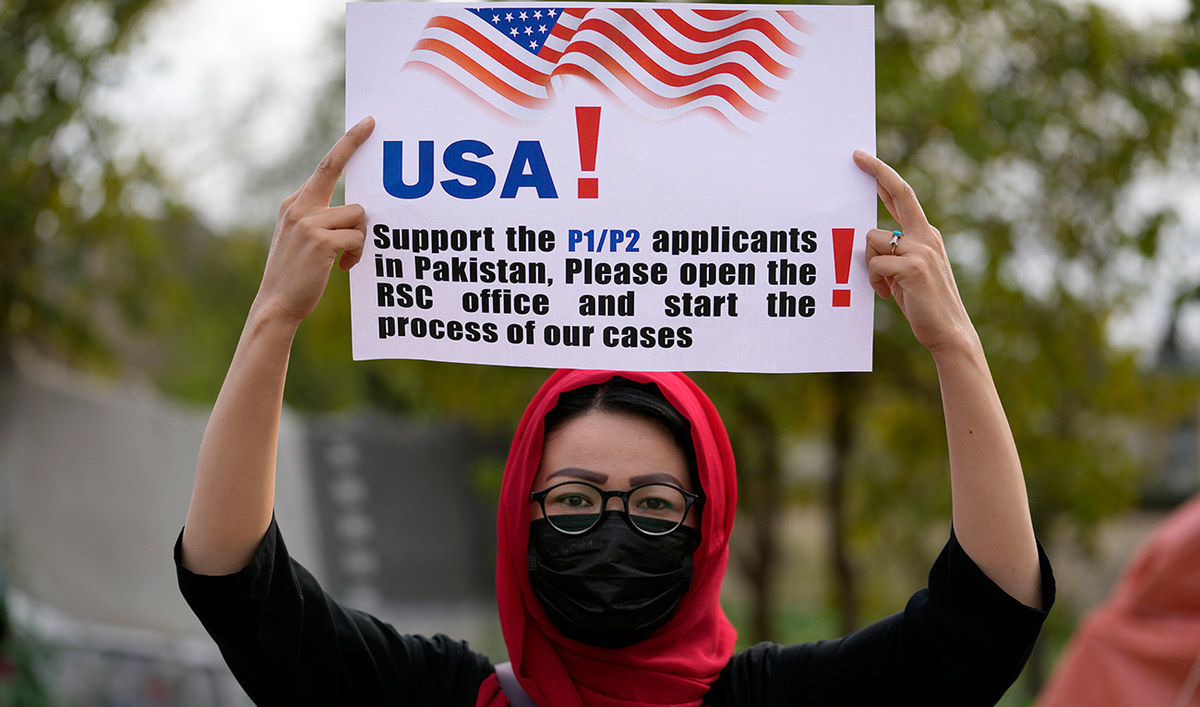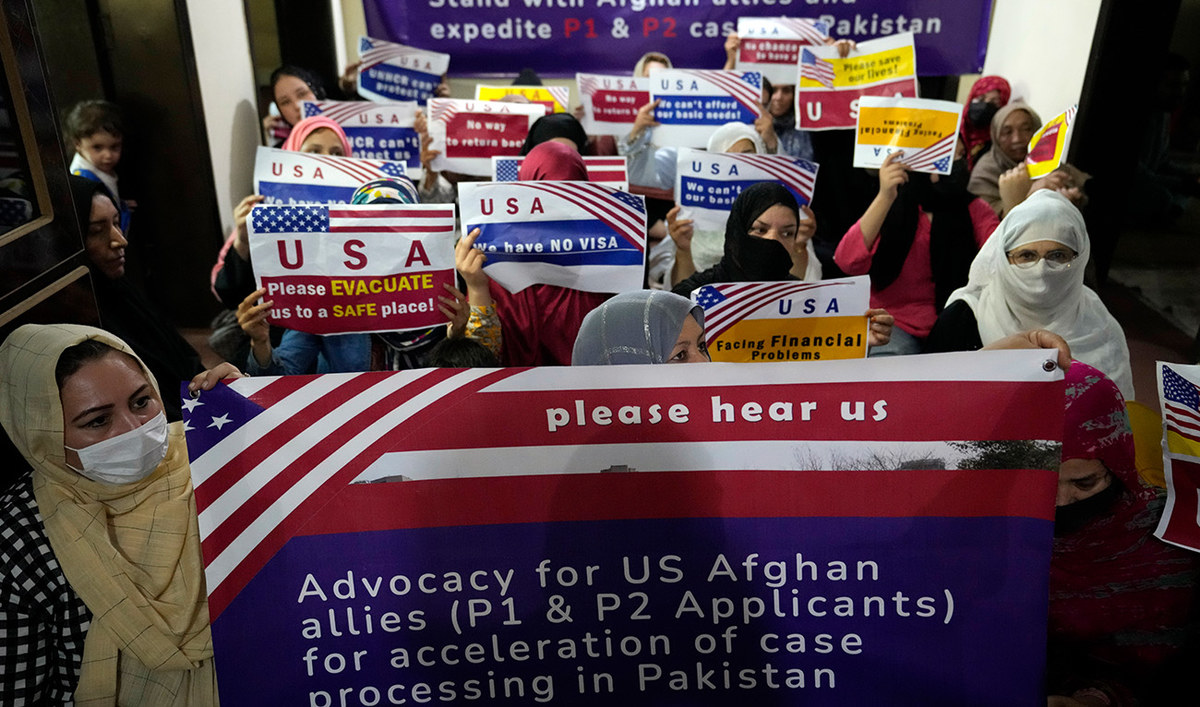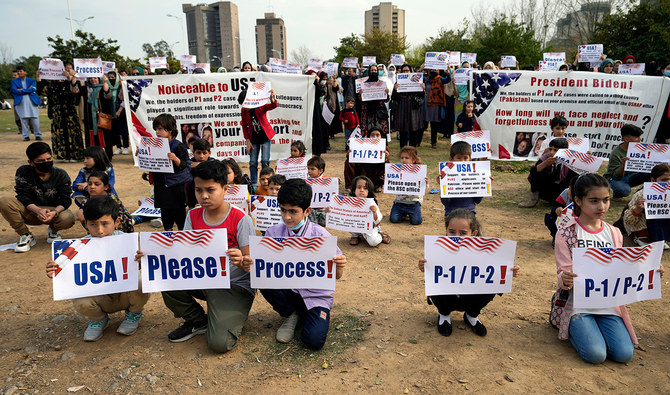ISLAMABAD: When the Taliban took control of Afghanistan, Shukria Sediqi knew her days in safety were numbered. As a journalist who advocated for women’s rights, she’d visited shelters and safe houses to talk to women who had fled abusive husbands. She went with them to court when they asked for a divorce.
According to the Taliban, who bar women from most public places, jobs and education, her work was immoral.
So when the Taliban swept into her hometown of Herat in western Afghanistan in August 2021 as the US was pulling out of the country, she and her family fled.
First they tried to get on one of the last American flights out of Kabul. Then they tried to go to Tajikistan but had no visas. Finally in October 2021, after sleeping outside for two nights at the checkpoint into Pakistan among crowds of Afghans fleeing the Taliban, she and her family made it into the neighboring country.
The goal? Resettling in the US via an American government program set up to help Afghans at risk under the Taliban because of their work with the US government, media and aid agencies.

An Afghan refugee attends a rally demanding their U.S. visas to be processed in Islamabad, Pakistan, Sunday, Feb. 26, 2023. (AP)
But two years after the US left Afghanistan, Sediqi and tens of thousands of others are still waiting. While there has been some recent progress, processing US visas for Afghans has moved painfully slowly. So far, only a small portion of Afghans have been resettled.
Many of the applicants who fled Afghanistan are running through savings, living in limbo in exile. They worry that the US, which had promised so much, has forgotten them.
“What happens to my children? What happens to me?” Sediqi asked. “Nobody knows.”
During two decades in Afghanistan after its 2001 invasion, the US relied on Afghans helping the US government and military. Afghan journalists went to work at a growing number of media outlets. Afghans, often women working in remote areas, were the backbone of aid programs providing everything from food to tutoring.
Since 2009, the US has had a special immigrant visa program to help Afghans like interpreters who worked directly with the US government and the military.
Then, in the waning days of the US presence in the country, the Biden administration created two new programs for refugees, expanding the number of Afghans who could apply to resettle in the US
The visas, known as P-1 and P-2, are for aid workers, journalists or others who didn’t work directly for the US government but who helped promote goals like democracy and an independent media that put them at risk under the Taliban.

Afghan refugees hold an indoor rally to demand their U.S. visa to be processed in Islamabad, Pakistan, Friday, July 21, 2023. (AP)
The programs were intended to help people like Enayatullah Omid and his wife — Afghans who helped build the country after the 2001 Taliban ouster and were at “risk due to their US affiliation” once the US withdrew.
In 2011, Omid started a radio station in Baghlan province with the help of the US-based media training nonprofit Internews and funding from the US Agency for International Development. He was the station’s general manager but did everything from reporting on-air to sweeping the floors at night. His wife, Homaira Omid Amiri, also worked at the station and was an activist in the province.
When the Taliban entered Baghlan on Aug. 9, 2021, Omid said he did one last thing: He burned documents to keep the Taliban from identifying his staff. Then he and his wife fled.
They stayed at shelters arranged by a committee to protect Afghan journalists until the Taliban shut them down. Internews referred Omid to the US refugee program in the spring of 2022. Told he had to leave Afghanistan for his case to proceed, Omid and his wife went to Pakistan in July 2022.
Even in Pakistan Omid doesn’t feel safe. Worried about the Taliban’s reach, he’s moved three times. There are police raids targeting Afghans whose visas have run out. As he spoke to The Associated Press, he was getting text messages about raids in another Islamabad neighborhood and wondered how much he should tell his already stressed wife.
He said America has a saying: Leave no one behind.
“We want them to do it. It shouldn’t be only a saying for them,” he said.
The American airlift in August 2021 carried more than 70,000 Afghans to safety, along with tens of thousands of Americans and citizens of other countries — plane after plane loaded with the lucky ones who managed to make their way through the massive crowds encircling Kabul airport. Most gained entry to the US under a provision known as humanitarian parole.
Many more are still waiting. There are about 150,000 applicants to the special immigrant visa programs — not including family members. A report by the Association of Wartime Allies said at the current rate it would take 31 years to process them all.
Separately, there are 27,400 Afghans who are in the pipeline for the two refugee programs created in the final days of the US presence in Afghanistan, according to the State Department. That doesn’t include family members, which potentially adds tens of thousands more. But since the US left Afghanistan it’s only admitted 6,862 of these Afghan refugees, mostly P-1 and P-2 visa applicants, according to State Department figures.
In June, US Secretary of State Antony Blinken said the US has relocated about 24,000 Afghans since September 2021, apparently referring to all the resettlement programs combined.
Among the refugee program applicants are about 200 AP employees and their families, as well as staff of other American news organizations still struggling to relocate to the US
Krish O’Mara Vignarajah, president and CEO of the Lutheran Immigration and Refugee Service, said the US refugee process in general can be agonizingly slow, and waits of as long as 10 years are common. Furthermore, former US President Donald Trump gutted the refugee system, lowering the annual number of accepted refugees to its lowest ever.
Other challenges are unique to Afghan immigrants, said Vignarajah. Many Afghans destroyed documents during the Taliban takeover because they worried about reprisals. Now they need them to prove their case.
“The grim reality is that they’ll likely be waiting for years on end and often in extremely precarious situations,” Vignarajah said.
In a recent report, the Special Inspector General for Afghanistan Reconstruction, a body created by Congress to oversee government spending in Afghanistan, faulted the various resettlement programs set up for Afghans.
“Bureaucratic dysfunction and understaffing have undermined US promises that these individuals would be protected in a timely manner, putting many thousands of Afghan allies at high risk,” the report said.
It also criticized the lack of transparency surrounding the refugee programs, which it said has left Afghans considering whether to leave their country to await processing without “critical information” they need for such a crucial decision.
In a sign of the confusion surrounding the process, applicants like Omid and his wife were told they had to leave Afghanistan to apply, a costly endeavor involving selling their possessions, going to another country and waiting. They, like many others, ended up in Pakistan — one of the few countries that allows Afghans in — only to discover the US was not processing refugee applications there.
That changed late last month when the State Department said it would begin processing applications in Pakistan.
However, Congress has so far failed to act on a bill that seeks to improve efforts to help Afghans still struggling to get to America.
The State Department declined an AP request for an interview but said in a statement it is committed to processing Afghan refugee visas. In June, Blinken applauded the efforts that have gone into helping Afghans resettle in America but emphasized the work continues.
At the same time, the Biden administration has made progress in recovering from the Trump-era curtailment of the refugee system. The administration raised the cap on refugees admitted to the US to 125,000 a year, compared to Trump’s 15,000 in his final year in office. It’s unlikely the Biden administration will reach the cap this year, but the number of refugees and Afghans admitted is increasing.
Shawn VanDiver, who heads a coalition supporting Afghan resettlement efforts called #AfghanEvac, said he doesn’t agree with criticism that the refugee programs are a failure.
They have gotten off to a “really slow start and there are vulnerable people that are waiting for this much needed relief,” he said. “But I also know that ... from my conversations with government, that there is movement happening to push on this.”
Left with little information, Afghans in Pakistan compare what they hear from US officials about their cases in WhatsApp chat groups that have organized social media protests demanding swifter US action.
“Avoid putting our lives in danger again,” one post read.
Pakistan was already home to millions of Afghans who fled decades of conflict when the Taliban returned to power and an estimated 600,000 more surged into the country. While many had valid travel documents, renewing them is a lengthy and costly process. Raids looking for Afghans with expired visas have heightened tensions.
Abdul, who declined to give his surname for fear of arrest because his visa has expired, worked as head of security for an aid group in Afghanistan that specialized in economic help for women. The risks were enormous; three colleagues were killed while he worked there.
One of his last tasks was getting the group’s foreign staff to the airport to escape. The organization stayed open into 2022, when the Taliban detained Abdul for two weeks. After his release, a Taliban member said he could protect his family — if Abdul gave him his daughter in marriage.
Abdul knew it was time to leave. He, his wife and children fled that night to Iran. Late last year, when they were told their referral to one of the refugee programs had been approved, they went to Pakistan. Since then, there’s been no information.
Their visas now expired, the family is terrified to leave the house.
“The future is completely dark,” Abdul said. “I’m not afraid to die, I’m just really worried about the future of my children.”

























